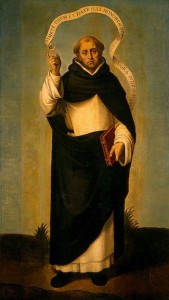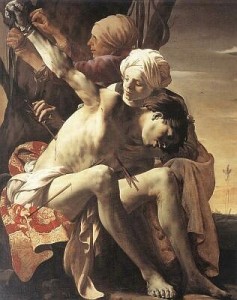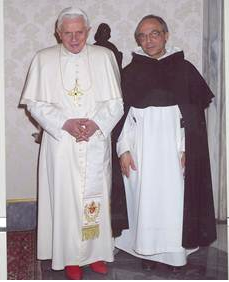The resignation of Pope Benedict and the election of Pope Francis have set the eyes of the world on the papacy, and in the midst of the great joy of Catholics everywhere, there have been no lack of prognostications and concerns, often from those who know little of the spiritual dynamics of the Kingdom, about the needs of our time. The Church, we are told, is in crisis: corruptions within, enemies without, challenges of all kinds to deal with, her own members to keep happy, non-members to mollify and perhaps bring into her communion. Underlying much of this talk is the unasked but implicit question: can the Church survive? At least, can she survive as something more than a meaningless artifact of history? Can she retain vitality and significance in this swirling and complex modern world?
At such a time it can be good to remember that the Church, from its beginnings, has always been in crisis. There has never been a time when a Judas was not betraying her, when a Peter was not denying her, when a crowd of those who should be honoring Christ were not instead shouting “Crucify him!” Touch the history of the Church at any point, and one finds overwhelming external challenges to her mission, and paralyzing internal rot threatening to destroy her most profound life. We can sometimes miss this by a kind of historical optical illusion. When we look to the past the true lines of the Church emerge: her saints grow larger and clearer as one recedes from them; the superfluous falls away and the Divine form, which is the Church’s true life, gains clarity. But like certain paintings that seem no more than meaningless splotches of color when viewed up close, but that resolve into intelligible patterns and shapes as one steps back, so the life and fortunes of the Church seem chaotic and troubled when viewed in their immediacy, and only sort themselves out by a retrospective gaze. Many seeming successes have thus ended in oblivion, and many seeming failures have become windows of light and heavenly life.
Identifying this pattern in the mode by which the Church makes her way through time is not to make light of such internal and external threats. It is precisely by honestly facing them and responding to them with the Holy Spirit’s wisdom that the Church’s inner life is renewed, and her foes diminished or brought into her fold. Rather, it is to remember that this is one of the notes of the Church: she seems ever to be dying, and yet she lives; she seems always to have become outmoded, and yet she springs up again young and fresh; she seems ever about to be overcome, and yet she sees all her enemies buried. Crucifixion and resurrection mark the Church in every age.
One such age of crisis unfolded in the fourteenth century, a seemingly grim time for the Church and for Western Christian civilization as a whole. That time witnessed the Hundred Years War between the English and the French, when France, Europe’s most populous and influential state, was repeatedly ravaged by battles and by the disease and famine that always accompany them. Intellectually, the great achievement of St. Albertus Magnus and St. Thomas Aquinas looked to be breaking into pieces, as nominalist philosophies arose that questioned the sacramental vision of the Christian world. The Ottoman Turkish empire was on the rise and becoming an increasingly potent external threat. And for three horrible years at mid-century the Black Death stalked Europe, leaving a third of its population, tens of millions, dead. In the midst of this dissolution of Medieval Society, its most significant institution, the one that gave the civilization its fundamental unity, the key to the whole of its religious system, the Papacy, went into crisis. Europe found itself looking at not one successor of Peter, but two, and for a brief time even three, with half of the European states backing one of the claimants, and half backing another.
 Into this maelstrom, while the Black Death was raging, Vincent Ferrer was born in Valencia, in the Kingdom of Aragon, now Spain. He entered the Dominican order as a young man; he was ordained in 1378, the year the Papacy went into schism. He died in 1419, having lived just long enough to see that schism healed at the Council of Constance. His priestly life was coterminous with this grave crisis in the life of the Church.
Into this maelstrom, while the Black Death was raging, Vincent Ferrer was born in Valencia, in the Kingdom of Aragon, now Spain. He entered the Dominican order as a young man; he was ordained in 1378, the year the Papacy went into schism. He died in 1419, having lived just long enough to see that schism healed at the Council of Constance. His priestly life was coterminous with this grave crisis in the life of the Church.
St. Vincent is among those saints whose life was so characterized by the miraculous that stories and legends of all kinds grew up around him. At the time of his canonization in 1455, those looking into his cause identified 873 miracles confirmed by direct evidence. His miracles were various and constant. He healed the sick, cast out demons, discerned hidden thoughts of those around him, correctly prophesied many events both large and small, controlled the weather, raised the dead. Many of his miracles were public, seen by thousands at a time. He would preach in his native tongue, and his listeners would sometimes hear the words in their own, a repetition of the miraculous preaching of the Apostles on the day of Pentecost. St. Vincent was the greatest preacher of his age, and during the last twenty years of his life he wandered up and down Europe, leading huge crowds too large to fit into a Church to embrace repentance and a life of virtue. He understood himself to have been given the task of preparing his hearers for the coming Day of Judgment. Many thousands were converted to or renewed in their faith by his strenuous labors.
His evident holiness of life, his contemplative spirit, his mastery of Catholic theology, and the miraculous signs of God’s presence that followed him everywhere, gained St. Vincent a place of great influence in his native Aragon and beyond. He was sought after for counsel by Kings and Popes as well as by the simplest of folk. And all along the way he steadfastly refused ecclesial honors, whether of a bishopric or a cardinal’s hat.
This kind of celebrity and these kinds of miracles might lead one to think of St. Vincent as something of a fanatic: a man of extreme views and of strange, if amazing, powers. But in this, St. Vincent was a true son of St. Dominic. His life and his teaching were characterized by a remarkable balance. He was a deeply prayerful man, and yet a man of action who was to die on the road, far from home, preaching. He led an austere life, but he would not let his followers go into excess in the practice of physical penances, insisting that it was rather the mind and the will that needed to be purified much more than the body. He spoke of the things of God with great feeling, but he was also a Doctor of Theology who took great pains to teach the truth accurately. He preached compellingly of God’s coming judgment, yet he was noted for his kindness, his compassion, his insistence on forgiveness as the very heart of God’s dealings with humanity. St. Vincent’s life and teaching expressed not the extremism of the fanatic, but the balance of the disciple: the truly human life.
If there was anything St. Vincent might be said to have been consumed by, it was the hope that the Papal Schism might be resolved and the grievous wound of disunity in the Church be healed. The situation was a complex and bewildering one. Since 1305, and for seventy years after, the Papacy had been situated in Avignon, still in Papal territory but surrounded by the kingdom of France. Largely by the influence of Saints Catherine of Siena and Bridget of Sweden, Pope Gregory XI had returned to the city of Rome in 1376. When he died two years later, a conclave was held and Pope Urban VI was elected his successor. There is no doubting that it was a difficult conclave; a great deal of pressure was put on the electors by the Roman populace, who insisted on an Italian pope even to the point of death threats. Nonetheless it seems clear that the cardinals acted not in fear but with resolve, and elected the man whom they thought should be Pope. Some three months later, a group of the Cardinals, intensely disliking Urban’s papal policy and claiming that the first conclave was invalid due to the duress under which it was held, elected another Pope who took the name Clement VII. There were now two Popes, both elected in conclave, both claiming to be the rightful descendant of St. Peter. The question turned on whether the first conclave was essentially free and therefore legitimate, or forced and therefore invalid. England, the Holy Roman Empire and northern Italy stood by Urban and the Roman line of Popes. France, Spain, Scotland and the Kingdom of Naples stood by Clement and the Avignon line. It is a sign of the genuine complexity of the case that two of the Church’s saints, both of whom were renowned for gifts of spiritual discernment, disagreed. St. Catherine of Siena upheld the claims of Urban, while St. Vincent was convinced that Clement and the Avignon line was the true one.
But St. Vincent’s main concern was that the two popes come to peace, mutually resign if need be, and a conclave be held to heal the deadly division. His authority and saintliness were so evident that his support of the Avignon line did much to secure its legitimacy. But when his own good friend, the Avignon-line Benedict, proved to be intractable and unwilling to take any steps towards unity, St. Vincent publicly withdrew his support, paving the way for an ending of the schism and a restoration of the unity of the Church.
If crisis is one of the marks of the Church, so also is the appearance of saints. St. Vincent Ferrer was one such bright light in the midst of the chaos of his time, a sign that Christ rules his Church even from the cross, then as now. And as with all the saints, St. Vincent’s light has not gone out, but continues to shine as a perpetual source of life and hope. A favorite teaching of his may be found to be of particular pertinence to our time: “The least desire for worldly greatness, no matter under what pretext of charity it arises, is the head of the serpent of hell. We must crush it with the cross.”
Source of Article: St. Vincent Ferrer and the Divided Papacy by Fr. Michael Keating, published online at Crisis Magazine on April 4, 2013.



